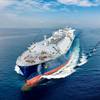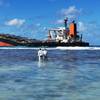A key to success in today’s tumultuous business environment is the ability to anticipate and adapt to the changing needs of its customers. It seems appropriate then, that a company founded on that principle continues to dominate its market and is currently poised for even greater expansion.
In 1955, a group of 10 investors saw the burgeoning oil and gas industry in the U.S. Gulf of Mexico as an opportunity to cater to a surfacing need. They instituted the development of the first offshore service vessel, Ebb Tide, and Tidewater Marine Service, Inc. — and the workboat industry — were born.
While much attention is paid to new construction, the company has found acquisition to be a cost-effective means to increase the company’s revenue base.
One of the most significant acquisitions in company history was that of Zapata Gulf Marine in 1992, which doubled Tidewater’s fleet to 500 vessels.
In 1996, under the guidance of its then-new chairman, president and CEO, William O’Malley, Tidewater bought out major competitor Hornbeck Offshore Services, giving Tidewater an additional 90 vessels — most of them in the U.S. gulf.
Just one year later, the company went in another direction — international — when it executed the takeover of U.K.-based O.I.L. Ltd., netting 100 vessels in areas throughout the world, thus further expanding Tidewater’s presence in the global market.
Since the beginning, a large part of Tidewater’s business strategy has centered on expansion, both vertically, by acquiring more vessels, and horizontally, by diversifying its business to include various industry sectors niches. Currently, Tidewater owns and operates more than 570 vessels in both the domestic and international oil and gas markets and is more than twice the size of its nearest competitor.
And the expansion isn’t over. Predicting growth in the deepwater sector, in January Tidewater — already the owner and operator of the largest international workboat fleet — embarked on a $300 million construction program. Over the next two to three years, the company will build both platform supply boats and anchor handlers — to serve the domestic and international deepwater exploration and production market.
Upon completion, the construction project “will probably put us at number two in the deep water (market), from having not been a player at all before,” said Tidewater vice president and corporate controller Joe Bennett.
In addition to building new boats, the company plans to purchase existing vessels to expand its fleet to serve the new industry niche. In October, the company announced the purchase of eight vessels from the Sanko Steamship Company — including four large anchor handling towing supply boats and four large North Sea type platform supply vessels — for $160 million in cash. Previously, the company had announced the acquisition of five similar vessels. With these vessels, as well as the 13 to 15 expected newbuilds, Tidewater is expected to enter the ranks of the leading companies serving the deepwater market.
However, the company plans to continue its presence in the shallow water market with construction of smaller boats as well as continuing acquisitions of preexisting vessels. “We will still have a large base of vessels to handle the shallower water, and that will continue to be our bread and butter,” said Bennett.
On October 19, Tidewater announced net earnings for the period ending Sept. 30 of $26.3 million in revenues of $146.1 million. For the same quarter last year, net earnings were $18.9 million on revenues of $139 million. Included in the earnings was the $10.9 million after-tax gain from the sale of Tidewater’s interest in Abu Dhabi-based National Marine Service.
“This is an exciting time,” said Bennett of Tidewater’s position in what seems to be an improving market. “Things are picking up and people are spending money. Rigs are going to work, and that means more business for us.”
Tidewater Emphasizes Environmental Commitment
Tidewater Marine recently emphasized its commitment to protecting the environment by extending a bilge water treatment program to virtually its entire fleet. HELI-SEP Oily Water Separators manufactured by Coffin World Water Systems LLC (CWWS) are helping the company accomplish its goal, while setting a new standard for environmental leadership.
HELI-SEP units are already used on the larger vessels in Tidewater’s fleet that are subject to the 15 ppm oil discharge limit mandated by IMO MEPC. 60(33). In addition, the company has now acted to install oily water separators onboard even its smaller workboats, which are legally exempt from that regulation. Of 200 units authorized under a new purchase agreement with Tidewater, CWWS has to date delivered more than 150 units, all on time or ahead of schedule, and the remaining deliveries will be completed by the end of the year. The value of the total purchase agreement is in excess of $500,000.
HELI-SEP oily water separators are equipped with a self-cleaning polishing pack and a permanent coalescing matrix that eliminates the need to replace filters. Each unit is shipped pre-piped and pre-wired to simplify installation.
CWWS offers a series of models with capacities ranging from 0.5 to 10 cubic-meters per hour (2.2 to 44 gpm), which can accommodate the full range of shipboard needs. For vessels calling in cruise ports, or in environmentally sensitive regions such as the Baltics and the Great Lakes, CWWS also provides advanced technology capable of meeting even more stringent discharge limits.
Subscribe for
Maritime Reporter E-News
Maritime Reporter E-News is the maritime industry's largest circulation and most authoritative ENews Service, delivered to your Email five times per week










